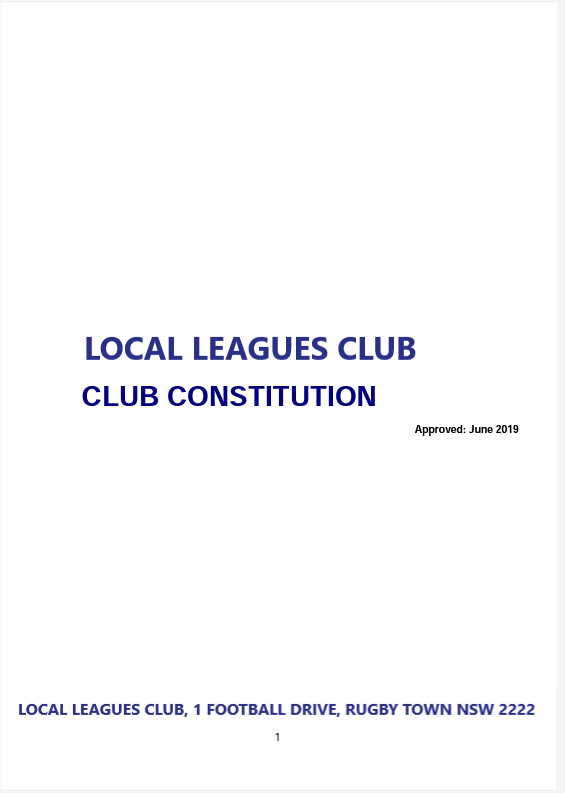The Demarcation Dilemma
Do you know where the line is between Governance and Management?

Do you know where the line is between Governance and Management? Board rooms across many industries, including the club industry, are filled with business owners and C Suite executives. There is a huge challenge for these men and women to remain at arm’s length with regard to management of the organisations they are charged with overseeing.
All through my governance training years, the challenge is to provide directors with the skills to oversee the operations of their organisation, without inviting them to get involved in the operations. The Australian Institute of Company Directors (AICD) have a great line – ‘Directors direct and Managers manage’ – which is a simple delineation, but many struggle to embrace the ethos.
What should Directors do?
Directors are charged, either by ownership, election or appointment to a board, to oversee the successful operation of their organisation, be it for profit, for purpose (a not-for-profit) or an incorporated association. In order to do this, directors need to have a sound knowledge of many (not all) aspects of the organisation’s operations. This means business owners and executive managers usually bring with them a raft of skills and experience in running an organisation, and so should understand what a successful operation looks like.
The primary focus for directors should be strategic not operational. They should focus on strategic direction, identifying opportunities for growth, potential threats to success, managing risk and setting key performance indicators (KPIs), or targets, for management and staff to achieve.
Highly respected AICD facilitator and governance expert Julie Garland McLellan also has a great quote for directors to guide their efforts – ‘Noses in and hands out’. By this Julie means directors should know everything a board can reasonably be expected to know about their organisation’s operations, but they must stay at arm’s length and not actually get involved in the day to day operations. Globally the trend has been away from Managing Directors, more towards Chief Executive Officers (CEO), to provide a clearer distinction between the role of the executive management and the board.
In some industries and organisation, like clubs in New South Wales, the CEO still fulfils the function of the company secretary, but is an executive member of the board, only in that capacity. All other directors (in clubs) are elected by their member peers to oversee the operations of the club.
This is best achieved when the board delegates the authority to manage the operations of the organisation to the CEO. The CEO can then delegate various portions of the operational delivery to his management team and staff. Together, they operate the organisation (in our case - club) whilst attempting to achieve the targets/KPIs set by the board.
The directors have therefore provided the direction to the management team and should then step back and let them do their thing. The board must monitor the results (this is the financial, legal, risk and reputational oversight) and ensure they provide the appropriate resources (budgeted funds, equipment and personnel) the team need to achieve those targets.
It is essential that the board are constantly aware of the financial well being of the organisation (and avoid trading insolvent), whilst monitoring and managing the risks – human, physical, cyber and environmental – to ensure the organisation is compliant, moral and ethical in all its dealings.
Directors must ensure all requisite policies and procedures are in place for the organisation, to be compliant with any and all legislation relevant to their operations. The responsibility for creating and implementing them however, lies with management.
Directors should also be looking at opportunities to grow the business through the many strategic options available to them –
X growth through identifying additional products or services the customers may desire,
X growth through acquisition of other similar organisations (or amalgamations in club speak) or
X growth through diversification into other allied revenue opportunities (like accommodation, aged care, day care, gymnasiums, medical facilities or retail options like supermarkets, petrol stations or car washes).
The best strategic direction is informed by finding out what the community needs and then seeing how the club can provide that product or service.
Active directors – those who are always looking for opportunities to grow the business, get involved in discussions and decisions and understand that they must apply themselves in good faith, in the best interests of the organisation and for a proper purpose - are a blessing for any organisation. Directors who do not attend meetings regularly, do not contribute in discussions at meetings and add little or no value to the board, should consider stepping aside and let others, who wish to make a solid contribution, have the opportunity to join the board.
What should Managers do?
Once the Board has delegated the responsibility of delivering the day to day operations of the organisation to the management team, they get on with running the business. The KPIs are set and the team work to deliver the daily, monthly, quarterly and annual results that the board and all stakeholders expect.
From the strategic perspective, the CEO and management team usually provide the research, data and technical input to the strategic planning process, applying their intimate operational knowledge of the industry they operate in. Their focus is on the minutiae – the how to do, what to do and when to do – to deliver the short and long term objectives that have been delegated to them by the directors.
Directors will have considered the three key resources – financial, physical and human – required to operate the business, but it is the management and staff who actually utilise these resources daily to achieve the goals.
Human resources are the largest resource the managers need to utilise, monitor and manage, to allow all staff to reach their full potential and maximise their input to the operations. Depending on the size of the organisation, this can require specialist staff to oversee all aspects of sound human resource and industrial relations management. Similarly, an organisation may require specialist staff for specific areas like finances, marketing, information technology, gaming and wagering (in clubs and pubs), food and beverage, general operations and facilities maintenance.
Managers are responsible for ensuring all policies and procedures, required to ensure operations are compliant with all legislation and best practices, are in place. Management must source these and ensure not only their existence, but they must train staff in the appropriate application of these and ensure any records of compliance are maintained and updated regularly (at least annually). To this point, all staff in clubs must have their mandatory certifications – Responsible Service of Alcohol (RSA) and Responsible conduct of Gaming (RCG) and any other things like Food Safety Supervisor Certificate (FSS) – to ensure they are all aware of their obligations in these areas.
Managers are also responsible for the management and maintenance of the physical resources of the organisation – buildings, plant, equipment, machinery, playing fields (football, bowling greens, squash courts etc.) and entertainment equipment – to enable the organisation to meet the community’s needs.
Most importantly, managers must manage the day to day financials of the organisation, ensuring they are watching turnover, managing costs and working towards maximising profits for the long term sustainability of the organisation. KPIs set here will include gross profit margins, net profit margins, wages ratios, debt to equity ratios and in clubs, the industry measure of EBITDARD (Earnings before Interest, Tax, Depreciation, Amortisation, Rent and Donations).
Great managers know from day to day how trade has been, what the turnover was, where the exceptions occurred and what the month to date (MTD) profit and loss picture is. And every month they check the Balance Sheet to ensure that equity is not being negatively impacted.
In summary – Directors provide the direction, guidance and oversee the operations of the organisation, whilst managers do the ‘heavy lifting’ of running the business every day, whilst working to meet the targets set by the board. Managers should also understand that the oversight by an educated and effective board is a great asset to them and should not feel threatened by the questions the board ask. When these two groups work together as a cohesive, functional collective, in an open, honest and trusting relationship, the organisation will really fly.
Should your board or management be interested in a Governance or Operational Audit, Ron Browne can provide either or both to benchmark where your organisation is today. Contact Ron at 0414 633 423 or ron@extrapreneurservices.com.au










